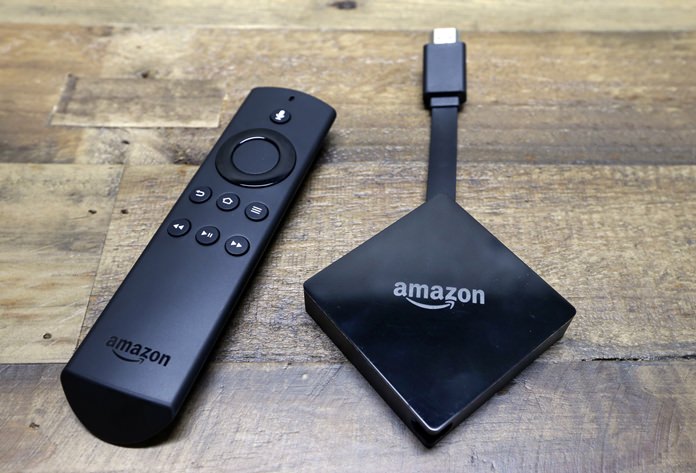
New York (AP) – Attention Fire TV owners: YouTube might soon disappear from your Amazon streaming device. But you’ll still have options.
 Google is threatening to pull YouTube from Fire TV by Jan. 1, the latest round in a fierce battle between the two tech heavyweights. If that happens, Fire TV owners can still watch on a phone, tablet or personal computer. That includes an Amazon Fire tablet, as Google hasn’t threatened to block that yet.
Google is threatening to pull YouTube from Fire TV by Jan. 1, the latest round in a fierce battle between the two tech heavyweights. If that happens, Fire TV owners can still watch on a phone, tablet or personal computer. That includes an Amazon Fire tablet, as Google hasn’t threatened to block that yet.
For those willing to abandon Fire TV, just about any other device will play YouTube. Not all of them will play video from Amazon, although Apple TV just got Amazon’s app Wednesday.
Here are some reasons you might want to stick with Fire TV – and some you might not.
The case for Fire TV
YouTube was never the centerpiece of Fire TV to begin with. It’s not even a full-fledged app on Fire TV – just a link to a YouTube website designed for mobile devices.
Fire TV itself is best seen as a companion to Amazon’s $99-a-year Prime loyalty program. Although Amazon has gotten better about promoting rival services, video available through Prime remains prominent.
The device has Amazon’s Alexa voice assistant built-in. In addition to weather, sports scores and stock quotes, it offers playback controls for some selected apps. That lets you ask Alexa to forward 30 seconds, for instance.
Amazon’s $40 Fire TV Stick is good for regular, high-definition TV sets. If you have a higher-resolution 4K TV, you’ll want the regular Fire TV for $70. There isn’t a lot of 4K video yet, but the price difference is small compared with what 4K TVs cost.
The regular Fire TV also offers high-dynamic range, which has better contrast and produces brighter whites and darker blacks. Again, HDR video is slowly coming.
On the downside, Fire TV doesn’t offer iTunes or Google Play video – and YouTube may soon join the list. Fire TV’s remote also lacks volume controls, something that’s becoming standard on streaming devices.
Google’s alternative
The current feud centers on Amazon’s refusal to sell some Google devices that compete with Amazon products. That includes Google’s Chromecast, a streaming device that’s cheap but slightly tricky to use, since you have to start video on your iPhone or Android phone and then switch the stream to the TV.
Plenty of video services work with Chromecast – but Amazon doesn’t let its video service work with the Google device.
Google offers other manufacturers its own software for streaming devices called Android TV. On those devices, Google’s YouTube and Play services often get prominent billing in search results, but at least you can get Amazon video. Again, no iTunes.
One of those gadgets is the Shield from Nvidia. It’s pricey, starting at $179, but comes with 4K and HDR. You get voice searches through Google’s Assistant – playback controls with some apps, weather info and some data you might never think to ask a TV, such as flight status.
Shield is powerful and designed with gamers in mind; one feature allows screen sharing of game play. A package that includes a game controller costs $20 more. The controller gives you a headphone jack for private listening and hands-free queries with Google Assistant.
Playing nice with both
Roku has one of the most complete channel libraries – more than 5,000, many of which you’ve never heard of. You can get YouTube, Google Play and Amazon video, but not iTunes.
Roku’s Express sells for just $30. The $50 Streaming Stick gets you a remote with volume buttons and voice search – though we’re talking basic queries related to shows and apps, not playback controls or information such as weather. The $70 Streaming Stick Plus adds 4K and HDR. Bells and whistles in the $100 Ultra include a remote that will emit a sound to help you find it under your couch cushions.
The Ultra’s remote has a headphone jack, so you can watch TV without waking up roommates. For cheaper models, you can get that through Roku’s smartphone app. (With Fire TV and Apple TV, you can pair wireless headphones.)
For Apple fans
Apple TV is the only device to support iTunes. It also has YouTube, but not Google Play. Amazon joined Apple TV on Wednesday.
Though an iPhone isn’t required, Apple TV will be most useful with one. The basic device is $149; a version with 4K and HDR costs $30 more. You’re paying for the experience – in particular, integration and syncing with other Apple gadgets. For instance, you can type passwords on an iPhone instead of navigating a keyboard on the TV.
Siri offers similar playback controls and information queries as Alexa and Google Assistant. The touchpad on the remote offers faster forwarding and rewinding than rivals.
And while all streaming devices offer more than just video, Apple TV goes much further in offering an iPhone-like experience on a big screen. You can browse Ikea’s catalog or order food from Grubhub, for instance.





